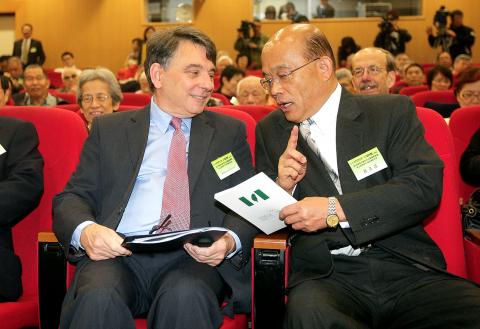Former American Institute in Taiwan (AIT) director William Stanton yesterday took issue with opinion polls showing that a majority of Taiwanese prefer maintaining the “status quo” in dealings with China.
Taiwan is actually increasingly leaning toward China, he said, and the “status quo,” as perceived by Taiwanese, was “problematic” and “an illusion,” given that China is growing ever stronger and Taiwan is increasingly dependent on China economically.
Taiwanese cannot unilaterally decide the development of cross-strait ties, Stanton said at the annual meeting of the World Taiwanese Congress in Taipei, adding that how much patience China shows toward maintaining the “status quo” remains a question if bilateral relations do not proceed the way China sees fit.

Photo: CNA
Pro-unification advocates often think of themselves as realists and say Taiwan has no choice other than uniting with China, and they optimistically imagine that with time and the model that Taiwan provides, it would ultimately produce a beneficial influence over China, Stanton said.
However, the Chinese Communist Party has given no indication that it would actually support democracy or brook any challenge to its authoritarian rule, Stanton said.
Moreover, although China’s economy is stronger than ever, it has also brought with it a rekindling of nationalism, expansionism and a hawkish mindset, he said.
Taiwan should develop a broader and more in-depth understanding of what challenges its national security faces, and re-examine its national defense budget, he said.
The declining support for national security may stem from the falling morale of its armed forces, he added.
Taiwan should strengthen and invest more in national defense, while reducing market protectionism, Stanton said, adding that Taiwan should adopt measures that would increase its appeal to foreign investors, as well as step up processes to set up free-trade agreements with other nations.

INVESTIGATION: The case is the latest instance of a DPP figure being implicated in an espionage network accused of allegedly leaking information to Chinese intelligence Democratic Progressive Party (DPP) member Ho Jen-chieh (何仁傑) was detained and held incommunicado yesterday on suspicion of spying for China during his tenure as assistant to then-minister of foreign affairs Joseph Wu (吳釗燮). The Taipei District Prosecutors’ Office said Ho was implicated during its investigation into alleged spying activities by former Presidential Office consultant Wu Shang-yu (吳尚雨). Prosecutors said there is reason to believe Ho breached the National Security Act (國家安全法) by leaking classified Ministry of Foreign Affairs information to Chinese intelligence. Following interrogation, prosecutors petitioned the Taipei District Court to detain Ho, citing concerns over potential collusion or tampering of evidence. The

NEGOTIATIONS: Taiwan has good relations with Washington and the outlook for the negotiations looks promising, Minister of Economic Affairs J.W. Kuo said Taiwan’s GDP growth this year is expected to decrease by 0.43 to 1.61 percentage points due to the effects of US tariffs, National Development Council (NDC) Minister Paul Liu (劉鏡清) said at a meeting of the legislature’s Economics Committee in Taipei yesterday, citing a preliminary estimate by a private research institution. Taiwan’s economy would be significantly affected by the 32 percent “reciprocal” tariffs slapped by the US, which took effect yesterday, Liu said, adding that GDP growth could fall below 3 percent and potentially even dip below 2 percent to 1.53 percent this year. The council has commissioned another institution

NEGOTIATIONS: The US response to the countermeasures and plans Taiwan presented has been positive, including boosting procurement and investment, the president said Taiwan is included in the first group for trade negotiations with the US, President William Lai (賴清德) said yesterday, as he seeks to shield Taiwanese exporters from a 32 percent tariff. In Washington, US Trade Representative Jamieson Greer said in an interview on Fox News on Thursday that he would speak to his Taiwanese and Israeli counterparts yesterday about tariffs after holding a long discussion with the Vietnamese earlier. US President Donald Trump on Wednesday postponed punishing levies on multiple trade partners, including Taiwan, for three months after trillions of US dollars were wiped off global markets. He has maintained a 10 percent

TRADE: The premier pledged safeguards on ‘Made in Taiwan’ labeling, anti-dumping measures and stricter export controls to strengthen its position in trade talks Products labeled “made in Taiwan” must be genuinely made in Taiwan, Premier Cho Jung-tai (卓榮泰) said yesterday, vowing to enforce strict safeguards against “origin laundering” and initiate anti-dumping investigations to prevent China dumping its products in Taiwan. Cho made the remarks in a discussion session with representatives from industries in Kaohsiung. In response to the US government’s recent announcement of “reciprocal” tariffs on its trading partners, President William Lai (賴清德) and Cho last week began a series of consultations with industry leaders nationwide to gather feedback and address concerns. Taiwanese and US officials held a videoconference on Friday evening to discuss the